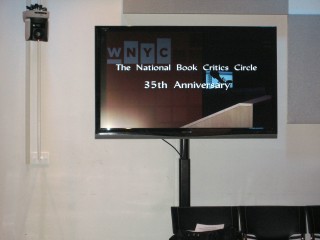Former board member Constance Casey, who writes for Slate, recalled the board in the late 1980s during the NBCC’s 35th anniversary celebration at WNYC’s Jerome L. Greene Performance Space on September 12:
I ran for the National Book Critics’ Circle board because publishing houses were loath to send review copies to a paper and a person they, in their East Coast wisdom, had never heard of.
“Is this your school paper, honey?” said the publicity director of a major publishing house somewhere in Manhattan’s East 50s. I’d been hired to start a book section for the San Jose Mercury News and given 12 pages to fill in a Sunday tabloid—Arts & Books. Different days. Needless to say, the Merc no longer has a book section. There barely is a Mercury News at all.
I’d been getting nowhere in arguments about high spending book buyers in the Bay Area. Now I could say, though I didn’t, just look at my name high up (alphabetically) on that list down the left side of the NBCC stationery.
The board met in a stuffy room upstairs at the Algonquin. At the head of the table was the president’s seat and behind that seat was the bathroom. Not only was it painfully obvious where you were going when you squeezed behind the president’s chair, but the flush was audible. I was a member during the highly civilized reigns of Brigitte Weeks, Nina King, and Jack Miles.
I was always deeply grateful for the commentary and good fellowship of fellow board member Joel Connaroe, who was sane, moderate, funny, knowledgeable, a peacemaker, and a great gossip. Becky Sinkler, who would soon leave the Philadelphia Inquirer to be the editor of The New York Times Book Review, was similarly kind and encouraging.
I mention these congenial souls because there was one person in the room who was terrifying. She came beautifully coiffed, with her lovely Lillian Gish hair parted in the center; beautifully dressed in paisley shawls fastened with an antique brooch; with lace at her throat. But Elizabeth Hardwick, so delicate in appearance, came with some weighty history, not the least of which was a marriage to Robert Lowell. She was a Presbyterian Kentucky girl whose ambition, fulfilled when she became one of the founders of the New York Review of Books, was to be a New York Jewish intellectual.
In retrospect I think she may have been making fun of her own dismissive Red Queen qualities. An example: When the letters of Randall Jarrell came up as a possible nominee she said softly in that lovely Southern accent, “If I recall correctly, Mary Jarrell stepped on my foot at a cocktail party in 1954. Why, I just don’t think I could consider that book.”
She rejected out of hand a book by three University of California sociology professors: “Why, I just don’t think I could ever consider a book that has three authors.” I think it was after that meeting that Carolyn See and I, little hippie lambs from the West, repaired to the bar at the Gramercy Park Hotel.
Wendy Lesser also came from California but was no less daunting, though in a different way, than Hardwick. She and David Lehman seemed always to have read every line of poetry written that year, by anyone anywhere.
When I wasn’t having a drink with Carolyn, I’d go with Nina King and Alida Becker to a borrowed office to double-check names and titles on the press release announcing the nominees. Absolute best thing ever: calling the authors to tell them they were nominated.
Being curious about poets who turn to writing a novel I had a kind of scoop one year—a first novel by the poet who would replace Louis L’Amour as the most famous writer in North Dakota. I called Louise Erdrich’s editor and said it would be a good idea to send a copy of Love Medicine to every member of the board a month before the nominating meeting. Carlin Romano, Inquirer book critic, referred to me shortly thereafter as a macher, then amending it to macherina.
Another major good moment was when Molly Giles, who often reviewed for the Merc (and who needed not a bit of editing, ever) won the 1990 Citation for Excellence in Reviewing. Accepting the prize Molly gave a hilarious talk about the fabulous perks of being a book reviewer. Among these: The big money. Showing off to your seatmate on the plane that you had an advance galley. In the front row of the audience was John. Updike, winner that year for “Rabbit at Rest,” doubled over with laughter.


